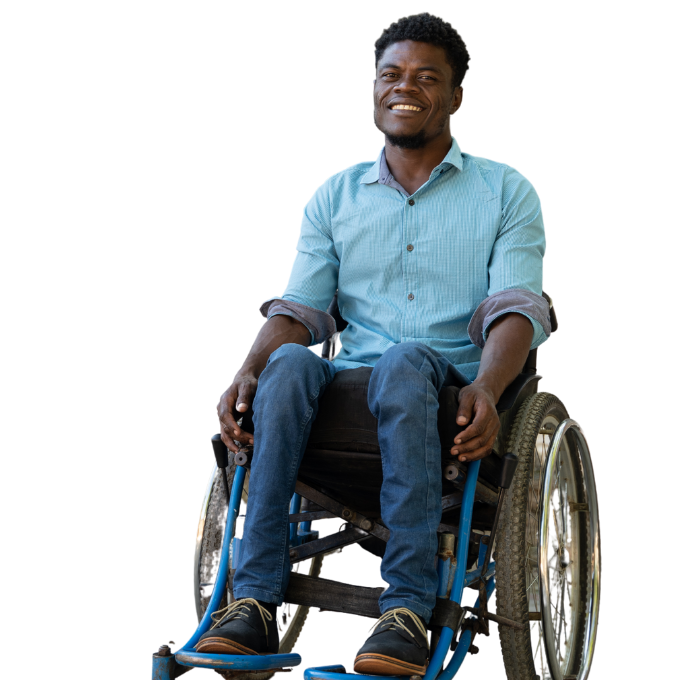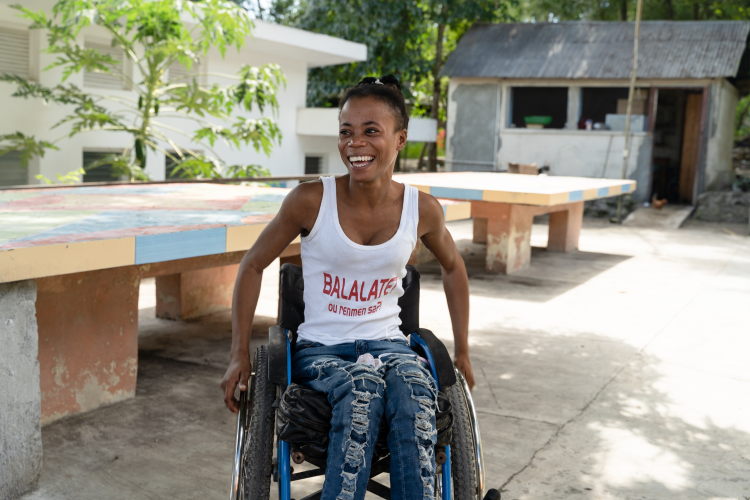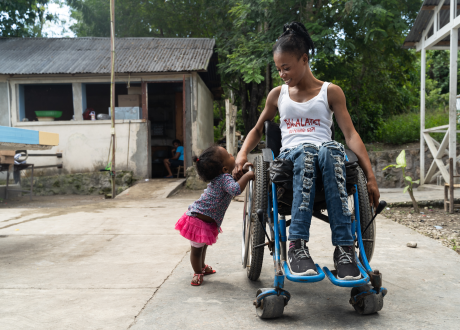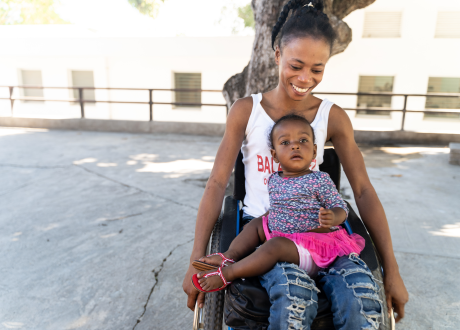“My favorite thing about my job is helping people realize their autonomy—just like I have.”
Your donation will help Maxsony provide critical support for patients with spinal cord injuries.


Ten years ago, Mamille was trapped under layers of rubble in Port-au-Prince. She was certain she wouldn’t survive. When the massive 7.0 magnitude earthquake struck, the walls of her home fell around her, trapping her alive. She was there for days.
Sometimes Mamille still can’t believe that she’s alive. Over the last decade, she has worked tirelessly with the staff at the Spinal Cord Injury Center to recover from her injuries and rebuild her life. Being a person with a disability in Haiti isn’t easy. The rocky terrain is difficult to navigate in a wheelchair. Most homes and public buildings aren’t built with accessibility in mind. And prejudice against people with disabilities is common. But Mamille couldn’t be prouder of how far she’s come and the life she has built for herself and her daughter.
Without the Spinal Cord Injury Program, so many people with disabilities would have already died. If I hadn’t found SCI, I wouldn’t be sitting in this chair today.
Mamille
Mamille doesn’t remember who dug her out of the rubble, and the initial weeks after the disaster are hazy. She was fading in and out of consciousness. She remembers laying in the street in pain and being turned away at a local hospital. During her search for care, she was lucky to meet a doctor who arranged for her to be taken by ambulance to the Dominican Republic, where she received surgery. But when she arrived back in Port-au-Prince, she had no home to return to, and she could hardly move. The earthquake had destroyed nearly every hospital in and around the capital. Mamille was turned away from the few facilities that could still provide care, as they were overwhelmed with patients and were constantly running out of supplies. However, a foreign aid worker saw her condition and contacted SBH, knowing we could provide care for people with spinal cord injuries like hers. Although it was difficult to navigate the rocks and debris that clogged the roads, we sent an ambulance to get Mamille and bring her all the way back to Fond des Blancs. Time was of the essence—we knew without additional care, Mamille couldn’t survive.


Once at SBH, doctors assessed Mamille’s condition and designed a treatment plan for her. She began receiving physical therapy twice per day to strengthen her limbs. She attended individual and group therapy sessions to help process her painful memories of the earthquake and her complex feelings about facing a new life as a person with a disability. She attended vocational training sessions to learn skills that would help her find employment. Soon, she began working for Build Health International and Haiti Projects, two organizations that operate out of Fond des Blancs. And two years ago when she became pregnant with her first child, Mamille was glad to be near the hospital so she could receive regular prenatal care and have a safe place to deliver her baby girl. Little Mylee Hadassa is the light of her life, and she is grateful for the independence and income-generating skills she gained through the Spinal Cord Injury program that enables her to support her family.
As the 10th anniversary of the earthquake approaches, Mamille’s feelings are mixed. The earthquake took so much from her and everyone she knows. She has endured unimaginable suffering, and it’s painful to remember the moments when she felt she could not make it one more day. But today, she is grateful for the independence she has gained, and how much her life has changed. “If I hadn’t found the Spinal Cord Injury program, I wouldn’t be here today,” she told us. “My doctors here really encouraged me. The program taught me how to work, to garden, to make things. I have been in a wheelchair for 10 years, but I am happy.”
Your donation will help Maxsony provide critical support for patients with spinal cord injuries.
